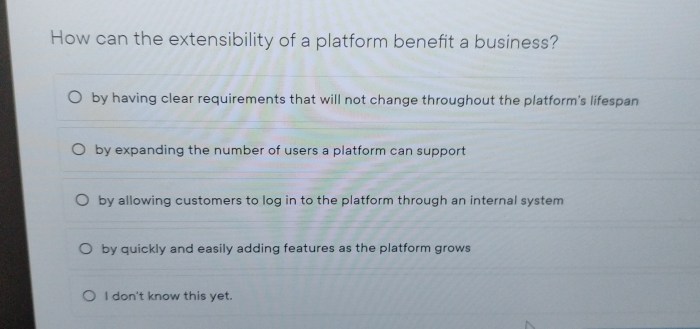How can the extensibility of a platform benefit a business? This question unlocks a captivating exploration into the transformative power of adaptable technology. Extensible platforms empower businesses to thrive in dynamic markets, unlocking a world of possibilities for growth, efficiency, and innovation.
With their inherent flexibility, extensible platforms serve as a catalyst for business agility, allowing organizations to swiftly adapt to evolving customer demands and industry trends. This adaptability empowers businesses to stay ahead of the curve, outpace competitors, and seize new opportunities.
Extensibility and its Impact on Business Growth: How Can The Extensibility Of A Platform Benefit A Business

Extensibility refers to the ability of a platform to be extended or customized to meet specific business requirements. It enables businesses to adapt to changing market demands and gain a competitive edge.
Explain how the extensibility of a platform enables businesses to adapt to changing market demands.
Extensible platforms allow businesses to quickly integrate new features and functionality, responding to evolving customer needs and industry trends. By leveraging pre-built modules and integrations, businesses can rapidly adapt their solutions without extensive development efforts.
Provide examples of businesses that have successfully leveraged extensibility for growth., How can the extensibility of a platform benefit a business
- Amazon Web Services (AWS) offers a wide range of cloud services that can be integrated to create customized solutions for various industries.
- Salesforce’s AppExchange provides a marketplace of third-party applications that extend the functionality of its CRM platform.
- Shopify’s open API allows merchants to build and integrate custom apps, tailoring their e-commerce experiences to specific customer segments.
Discuss the role of open APIs and third-party integrations in platform extensibility.
Open APIs enable businesses to connect their platforms with external applications and services. Third-party integrations provide access to specialized functionality, allowing businesses to enhance their solutions without developing everything in-house.
Cost Savings and Efficiency Gains

Extensible platforms reduce development costs by leveraging pre-built modules and integrations. They also streamline processes and improve operational efficiency.
Demonstrate how platform extensibility reduces development costs by leveraging pre-built modules and integrations.
Pre-built modules and integrations eliminate the need for costly custom development. Businesses can simply plug-and-play these components to create customized solutions, reducing time and resources spent on development.
Explain how extensible platforms streamline processes and improve operational efficiency.
Extensible platforms automate repetitive tasks and integrate disparate systems, reducing manual labor and streamlining workflows. This leads to improved operational efficiency and reduced operational costs.
Share case studies of businesses that have achieved significant cost savings through platform extensibility.
- Walmart leveraged Salesforce’s AppExchange to reduce development costs by 50% and accelerate its digital transformation.
- Netflix saved millions of dollars by migrating its infrastructure to AWS, leveraging its scalable and cost-effective cloud services.
- Uber utilized Google Cloud Platform’s AI capabilities to optimize its ride-sharing algorithms, reducing operational costs and improving efficiency.
Essential FAQs
What is platform extensibility?
Platform extensibility refers to the ability of a platform to be customized and expanded through the integration of additional modules, plugins, or third-party applications, extending its functionality and adapting it to specific business needs.
How does platform extensibility benefit businesses?
Platform extensibility empowers businesses by enabling them to tailor their systems to meet unique requirements, streamline processes, reduce costs, enhance customer experiences, and gain a competitive edge in the market.
What are some examples of extensible platforms?
Examples of extensible platforms include Salesforce, Magento, WordPress, and Shopify. These platforms provide open APIs and robust ecosystems of third-party integrations, allowing businesses to customize and extend their functionality to meet specific needs.
